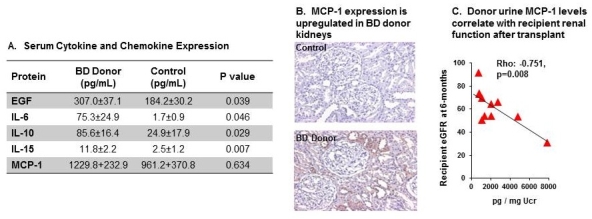Enhanced Production of Macrophage Chemoattractant Protein-1 (MCP-1) Within the Kidney in Brain Death Donors Predicts Recipient Allograft Function
Medicine/Surgery, University of Alabama at Birmingham, Birmingham, AL.
Meeting: 2015 American Transplant Congress
Abstract number: 14
Keywords: Brain death, Graft function, Inflammation, Kidney transplantation
Session Information
Session Name: Concurrent Session: Deceased Donor Management
Session Type: Concurrent Session
Date: Sunday, May 3, 2015
Session Time: 2:15pm-3:45pm
 Presentation Time: 2:27pm-2:39pm
Presentation Time: 2:27pm-2:39pm
Location: Room 119-A
Brain death (BD) induces an intense pro-inflammatory state, which may impact recipient immunity and graft function after kidney transplantation. The identification of biomarkers predictive of recipient graft function could enhance donor and recipient selection. We obtained blood and urine from 29 BD donors (BDD) prior to organ retrieval and cold flush. Wedge kidney biopsies were performed after cold preservation. Healthy, living volunteers provided sera and urine, and control kidney tissue was obtained from a biobank. Gene expression in biopsies was analyzed by real time PCR arrays. Serum and urine were analyzed by Luminex assay and urine values normalized to urine creatinine. Donor and recipient demographics and clinical parameters were analyzed. Of 29 cytokines and chemokines measured in the serum, there were significant systemic elevations of 4 proteins compared to normal healthy controls, indicative of the inflammatory environment within the BDD (Figure A). While systemic levels of MCP-1 were not significantly elevated, urine MCP-1 was markedly increased in BDD (4140.4±823.8 pg/mg creatinine) compared to normals (577.4±268.9 pg/mg creatinine; p=0.007). Moreover, while BDD kidneys showed only mild injury with minimal inflammation, immunohistochemical staining demonstrated dramatic MCP-1 expression predominantly in renal tubular epithelial cells, greater in the cortex than medulla (Figure B). Finally, we evaluated these relationships with recipient outcomes. We found a strong negative association, with donor urine MCP-1 inversely correlated with recipient eGFR at 6-months (Figure C). Thus, BD donors demonstrate activation of inflammatory pathways that are frequently systemic. In the case of MCP-1, localized production in the kidney is enhanced following BD, and is associated with poorer recipient graft function. Further investigation into this pathway may shed light on innate immune activation in the allograft. Finally, donor urinary MCP-1 may be a useful non-invasive marker for screening donors and predicting graft outcomes in kidney transplant patients.
.
To cite this abstract in AMA style:
Chen J, Antipenko S, Zmijewska A, Reed R, Locke J, Mannon R. Enhanced Production of Macrophage Chemoattractant Protein-1 (MCP-1) Within the Kidney in Brain Death Donors Predicts Recipient Allograft Function [abstract]. Am J Transplant. 2015; 15 (suppl 3). https://atcmeetingabstracts.com/abstract/enhanced-production-of-macrophage-chemoattractant-protein-1-mcp-1-within-the-kidney-in-brain-death-donors-predicts-recipient-allograft-function/. Accessed July 18, 2025.« Back to 2015 American Transplant Congress
